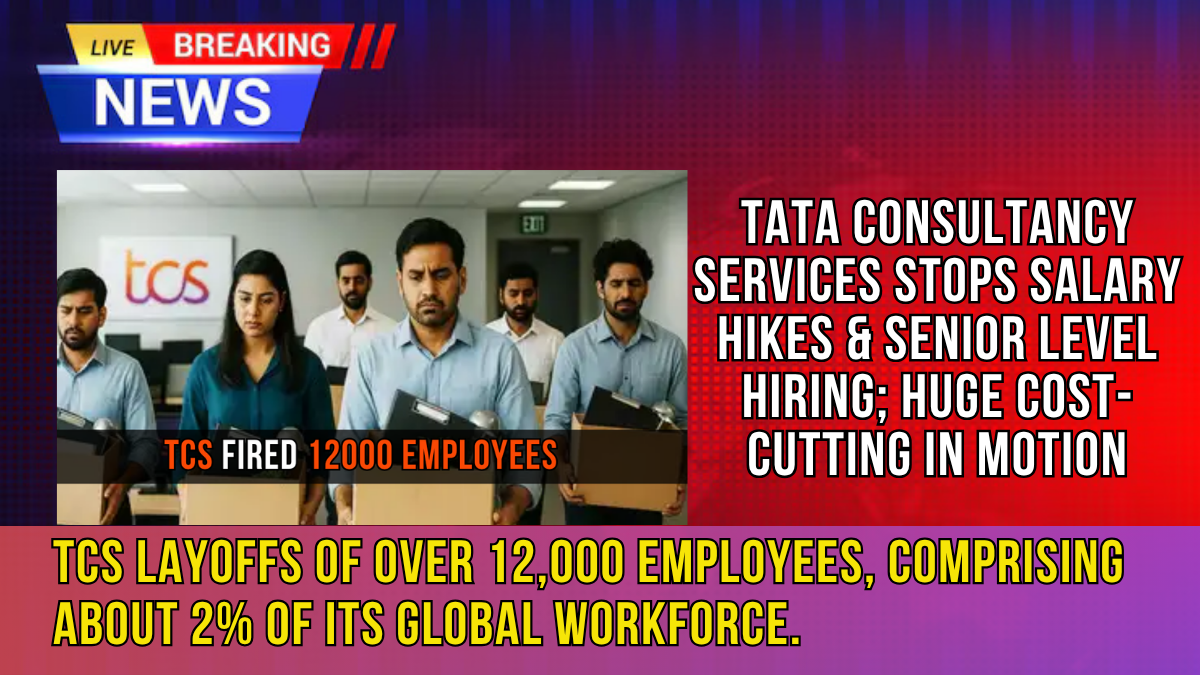Tata Consultancy Services (TCS), India’s largest IT services provider, has embarked on a sweeping cost-cutting exercise by announcing layoffs of over 12,000 employees, comprising about 2% of its global workforce. Accompanying this move is a suspension of annual salary increases and a freeze on recruitment for senior-level roles. These measures mark a significant shift in TCS’s strategy as the company braces for a turbulent industry landscape shaped by AI disruption, client hesitation, and global macroeconomic uncertainty.

Summary Table: TCS Layoffs
| Aspect | Details |
|---|---|
| Number of Job Cuts | Over 12,000 — around 2% of workforce |
| Salary Increments | Annual hikes suspended globally |
| Senior Level Hiring | Frozen across geographies |
| Focus of Restructuring | Mid and senior management roles |
| Main Drivers | Rising cost pressures, AI shift, weak demand |
| Workforce Size (as of June 2025) | ~613,000 employees |
| Support for Affected Employees | Severance, outplacement, counselling |
| Strategic Intent | Reskill, redeploy, become future-ready |
| Investor Reaction | Shares fell nearly 1.8% |
| Official Reference | [NPCI] — for background on policies |
Official citation info: sources include ET, Reuters, The Economic Times. See bottom for links.
Scale of the Layoffs
According to public statements and reporting by Reuters and Economic Times, TCS will cut around 12,200 jobs in FY26, largely impacting middle and senior management. With over 613,000 employees as of June 30, 2025, this shake-up is equivalent to reducing the workforce by about 2%.
The layoffs are tied to a broader transformation where the company aims to become future-ready by doubling down on AI, cloud, and digital transformation capabilities. TCS CEO K. Krithivasan has emphasized that these decisions are driven by a skills mismatch rather than sheer automation-induced redundancies .
Salary Hikes Suspended
In a parallel move, TCS has announced that annual pay hikes—typically a key talent retention tool—will be paused globally. Both lateral and existing employees, especially at higher levels, will not receive merit or inflation-linked increments for the current cycle.
Some internal reports indicate that variable pay for senior employees has also been slashed for three consecutive quarters, even as bonuses to top performers become subdued .
Freeze on Senior-Level Hiring
TCS has further halted hiring of experienced professionals and senior leaders. Onboarding delays have reportedly extended beyond 65 days for lateral hires—a marked departure from previous staffing norms. The freeze is part of the firm’s broader workforce realignment, encouraging redeployment and reskilling rather than bringing in fresh senior resources.
Drivers of TCS’s Strategy
1. Rising Cost Pressures
Operational costs have risen sharply. Analysts estimate that trimming this 2% of headcount may cut overall employee cost by up to 4%, equating to roughly 12% of TCS’s net profit for FY25.
2. Shifting Demand Dynamics
Client spending—especially from North America—has slowed, with major deals delayed or cut. Global economic uncertainty and tariff concerns have also weighed on demand projections.
3. AI and Automation Imperative
TCS continues to invest heavily in AI deployment, digital platforms, and cloud-based services. According to the Economic Times, AI is not directly reducing headcount, but roles lacking alignment with future technology needs are being trimmed .
Internal Impact and Union Response
Internal restructuring includes a policy that mandates employees to be assigned a billable project within 35 days. Failure to secure deployment can lead to termination—initially affecting bench staff across locations such as Hyderabad, Pune, Chennai, and Kolkata.
Employee unions have voiced strong opposition. The welfare group NITES has written to the Labour Ministry objecting to what it sees as opaque benches and illegal terminations. Concern extends to delayed onboarding and professionals stuck in procedural limbo.
Stakeholder Response
Investors
Shares of TCS fell approximately 1.8% post the announcement, signaling investor reservations about near-term execution risk and weaker growth outlook.
Analysts
Brokerage firm Jefferies labelled the move as a potential “canary in a coal mine” for India’s broader IT services sector. HFS Research commented that companies must shed older layers and bring in newer skill sets to be sustainable in AI-driven models.
Government Watch
India’s Ministry of Electronics and IT is closely monitoring the situation. Officials underscore the importance of initiatives like Employment Linked Incentives and expanded reskilling opportunities to absorb displaced talent.
TCS Support Measures for Affected Employees
TCS has pledged to provide impacted associates with:
- Notice period pay
- Severance packages
- Extended insurance benefits
- Outplacement support and counselling
The company aims to soften the transition and offer steps to rejoin in reskilled roles where applicable.
Longer-Term Strategy: Realigning Workforce for Tomorrow
TCS describes the reshuffle as part of its journey to becoming a future-ready organisation. Key pillars of this strategy include:
- Upskilling mid-career employees to take on AI-based roles
- Deploying AI internally and with clients at scale
- Streamlining overhead layers and expanding into new geographies
- Building infrastructure for digital transformation services
The result is a leaner, more agile TCS that is aligned with global trends and less reliant on legacy pyramid structures.
Broader Implications for the IT Sector
TCS’s move could signal deeper changes across Indian IT:
- A shift from volume-based models to specialised talent pools
- Reduced hiring for campus graduates without AI or cloud skills
- Greater industry-wide emphasis on reskilling and bench utilisation norms
- Pressure on cost structures and margins amid rising executive compensation levels, raising ethical and reputational questions
Frequently Asked Questions
Q. How many employees is TCS laying off?
A. Over 12,000, approximately 2% of its workforce.
Q. Are salary hikes still being given?
A. No. TCS has suspended all annual salary increases globally.
Q. Will TCS continue hiring for senior roles?
A. No. Hiring at mid and senior levels is frozen across regions.
Q. Why is TCS cutting jobs?
A. Primarily due to skills mismatch, rising cost pressures, delayed client deals, and an urgency to realign with AI and digital trends.
Q. What kind of support is being offered to laid-off employees?
A. TCS plans to offer severance pay, outplacement support, extended benefits, and counselling.
Q. How are investors reacting?
A. TCS shares fell around 1.8%, with analysts flagging execution risk and slow revenue growth.
Q. What does this mean for India’s IT industry?
A. It reflects a broader shift toward niche, technology-aligned workforce models, emphasis on reskilling, and a move away from traditional staffing pyramids.
Conclusion
TCS’s recent announcement to lay off over 12,000 employees, freeze salary hikes, and halt senior hiring underscores a firm recalibration amidst weak demand, rising costs, and technological change. These are not isolated decisions, but part of a strategic realignment to make TCS more competitive, agile, and tech-forward.
While short-term pain—especially for mid- and senior-level employees—is unavoidable, the firm is betting that this reset will help it navigate the next wave of disruptions powered by AI and digital transformation. For the broader IT ecosystem, TCS appears to be setting a precedent: cost discipline, skill alignment, and structural agility will define winners in the years ahead.
For More Information Click HERE











